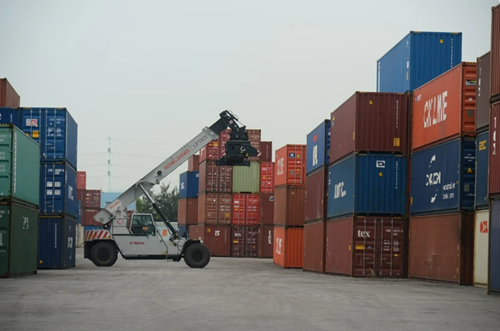While the monthly export value in the early part of the year ranged from 8.3 to 8.9 billion USD, even dropping to about 7 billion USD, that in the past two consecutive months both surpassed 10 billion USD.
    |
 |
|
Loading export goods at Dinh Vu Port, Hai Phong city (Photo: kinhtedothi.vn) |
Overall, the country exported a cumulative total of 66.09 USD worth of products to the U.S. between January and July, an annual rise of 24.4% - the highest among its importers.
In the seven-month period, American buyers spent a monthly average of close to 9.6 billion USD on purchasing goods from Vietnamese suppliers. Within the first half, they channeled 11.16 billion USD into computers, electronic products, and components; 9.19 billion USD into machinery, equipment, and spare parts; 7.21 billion USD in garment-textile; and 5.5billion USD into phones and components, up 51.6%, 15.8%, 3.6%, and 34.3%, year-on-year respectively.
With the U.S. accelerating goods purchases for the year-end festive season and the volume of their goods in stock plunging, the number of orders from U.S. buyers is expected to grow significantly.
Vu Vinh Phu, an economic expert, predicted Vietnamese exports to the market such as electronics, leather and footwear, garment textiles, farm produce, machinery and equipment will continue to recover in months to come.
These product categories have seen improvement in quality and competitive pricing thanks to substantial foreign direct investment in production and export activities as well as their deep integration into supply chains, making them more favored and trusted by U.S. importers.
If the current growth momentum is maintained, bilateral trade could reach 135 billion USD this year.
As Vietnamese exports accelerate, they also face numerous trade defense cases. As of June, they have encountered over 250 trade defense investigations from 24 markets. The U.S. alone has initiated 64 investigations, accounting for 25% of the total. In 2023, out of the 15 new cases initiated by foreign countries against Vietnamese exports, the U.S. initiated the most with seven cases.
Nevertheless, trade defense is a typical aspect of international commerce. Chu Thang Trung, Deputy Director General of the Ministry of Industry and Trade’s Trade Remedies Authority, explained that the U.S. has extremely stringent laws on investigation and application of defense measures. “They investigate goods from all countries, not just Vietnam. For countries with large export volumes to the U.S., the frequency of trade defense cases will be higher," Trung said.
“The point is overcoming these obstacles to maintain our export markets and promote sustainable bilateral trade by complying with U.S. regulations, enhancing product competitiveness through quality, increasing the value-added content in our products, and avoiding price-based competition, thus reducing the risk of becoming targets for trade defense investigations.”
Trade defense is a routine activity in international trade, but it poses difficulties for Vietnamese enterprises because the U.S. does not recognize Vietnam as a market economy. This means that Vietnamese exporters face discrimination in anti-dumping and subsidy investigations since their actual production costs are not used to calculate dumping margins. Instead, “surrogate values” from a third country are used.
Therefore, in specific cases, Vietnamese businesses need to prove to U.S. authorities that the dumping accusations are inaccurate, providing information and data on their production activities and fair competition in an equal environment, recommended a representative from the Trade Remedies Authority.
Source: VNA